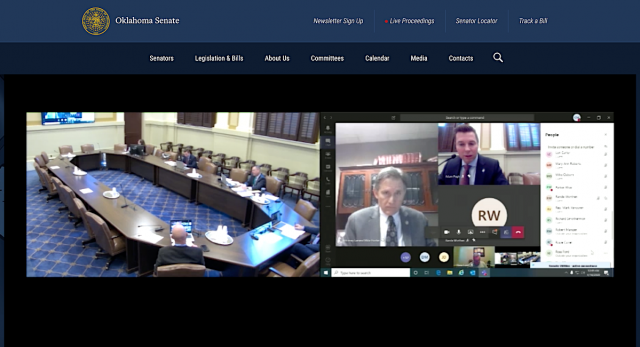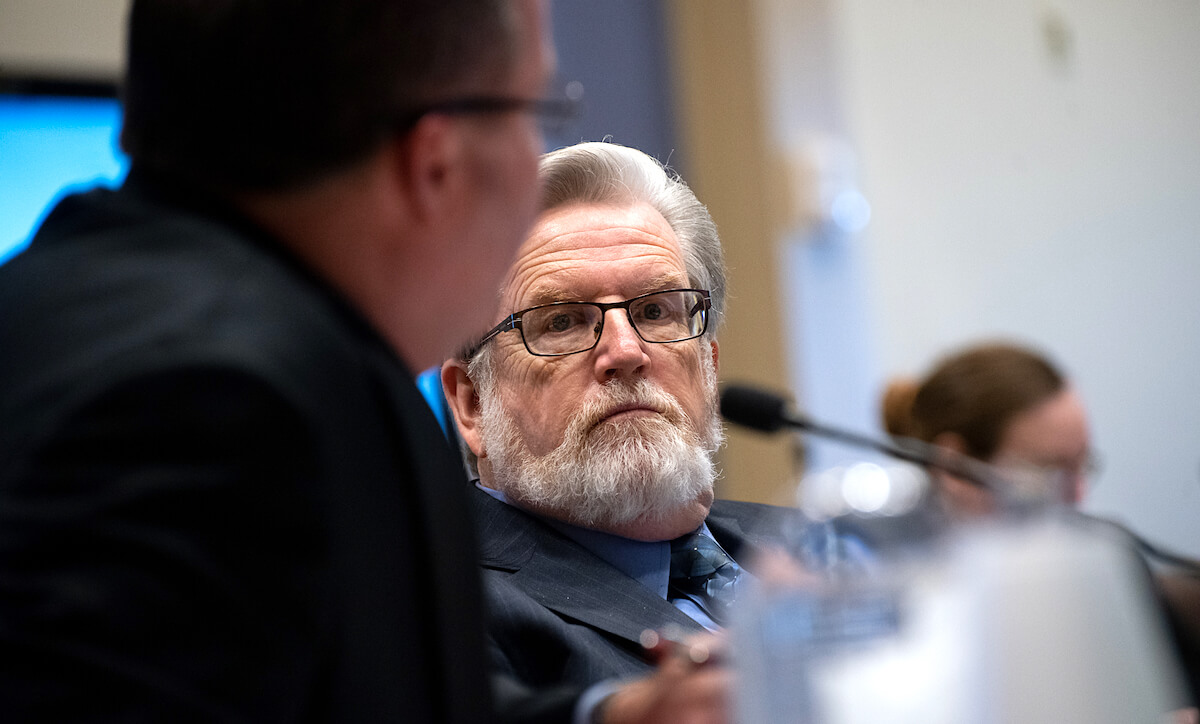

Turmoil related to the COVID-19 crisis is disrupting proactive programs, exacerbating budget issues and requiring the re-prioritization of efforts within Oklahoma’s public safety and judicial agencies.
Such was the magnitude of discussion from today’s joint meeting of Senate and House appropriations and budget subcommittees on public safety and judiciary. Called to review budget options for Fiscal Year 2021, the meeting was conducted with some lawmakers in person and others dialed in from home via videoconference.
Sen. Adam Pugh (R-Edmond) led the hearings, which he called “very unique.”
“I know a lot of people serving — not just in state agencies, but really a lot of citizens across the state — are innovating and making a lot of personal sacrifices and professional sacrifices to keep providing for those who need,” Pugh said to Jari Askins, director of the state’s court network.
The judicial system could be one of Oklahoma’s most dramatically affected areas, with the former lieutenant governor telling lawmakers that a cratering of court fees will jeopardize the ability of district courts to make payroll sooner rather than later, even if Fiscal Year 2020’s revenue failure is addressed with state reserves.
“We’re short. We’re not going to be short for April, but May and June look really scary,” said Askins, who expects only about $3 million to $4 million of fees to be collected through June 30. “The problem is, I don’t know when that $3 or $4 (million) will come in. If it spreads out, I’m still cash poor — if you would — when it hits in terms of being able [to make] payroll.”
Trent Baggett, CEO of the District Attorneys Council, said the state’s 27 DA districts have also seen court fees — and, thus, their non-appropriated funding — plummet. He and Askins agreed that fees accumulated through the judicial process have been trending downward for years owing to justice reform efforts and other factors. The pandemic, however, has exacerbated the funding dilemma.
“I would say it has exposed our system and how ill-prepared we were to deal with a pandemic or a statewide disaster,” Baggett said. “That is the silver lining. We are now aware of that, at least to an extent, and we can make more effort to prepare — God forbid — the next time this would happen.”
He said district attorneys’ biggest challenge has been preparing employees to telework and that the pandemic “has exposed is how few laptops we have in the system.”
The Oklahoma State Bureau of Investigation, the Oklahoma Attorney General’s Office, the Oklahoma Department of Corrections and the Department of Public Safety also made presentations and answered questions during Thursday’s six-hour meeting.
Strained DA offices could lay off more employees

Pugh asked Baggett whether the District Attorneys Council had been tasked by the Stitt administration with considering and explaining the effects of a 3 percent appropriations cut. The same question had been asked by Senate Appropriations and Budget Committee Chairman Roger Thompson (R-Okemah) of other agencies, and the query underscored tension between legislative leaders — who have largely advocated for avoiding cuts — and Stitt, who has said Oklahoma government needs to “tighten our belt.”
Baggett and others said Mike Mazzei, the governor’s secretary of budget, had asked for reports on how the agencies would absorb up to a 3 percent cut.
“All that we got was a request for how we would handle that, and so we complied,” Baggett said, noting his council had asked its 27 district attorneys to analyze a potential 3 percent cut. “The responses we got back were that they thought it would be approximately 17 full-time employees and three part-time employees as well. And there were about three districts that said they would have to consider furloughs.”
Jason Hicks, district attorney for Caddo, Grady, Jefferson and Stephens counties, said since he was elected in 2010 the state’s DA offices are “down 50 people already.” Angela Marsee, district attorney for Beckham, Custer, Ellis, Roger Mills and Washita counties, said rural district attorney offices are already operating with skeleton crews and that terminating or furloughing staff members would exacerbate existing difficulties in retaining employees.
“These folks have been coming into work because we are essential and most of us do not have the ability to telework with what we do,” Marsee said.
DPS leader questions internet for tag agents
Leaders of other agencies who presented to lawmakers Thursday also explained how they would handle funding cuts.
John Scully, the director of the Oklahoma Department of Public Safety, said a 3 percent cut would total about $3.1 million and that his team was considering a few options: trimming its next academy for state trooper training, foregoing ordering 55 new vehicles by replacing or rebuilding existing cars’ engines, and ending internet service for tag agencies, which are private enterprises that contract with DPS to provide state services and are facing scrutiny from the Stitt administration.
“It’s my opinion that internet service is not equipment,” said Scully, referencing what DPS is authorized to purchase for tag agencies. “Somewhere down the line that was started.”
Sen. Chuck Hall (R-Perry) and other legislators said tag agencies are extra important for older and rural populations that have difficulty accessing state services online. He also said tag agencies serve as important physical businesses in rural Oklahoma.
Sen. Darrell Weaver (R-Moore), himself a former director of a state public safety agency, signaled legislative desire to avoid budget cuts by asking Scully what he would do if he could choose between trimming his budget 3 percent or tapping funds from a savings account.
“If it was a savings account I had access to that I could pull funds from to pay for those items? I would do that,” Scully said.
Hunter: AG Office saves agencies money

Oklahoma Attorney General Mike Hunter also told legislators he would like to see his office held harmless for Fiscal Year 2021’s budget, if possible.
“We understand the constraints, and it’s going to be important for every agency — including our agency — to be team players,” Hunter said.
But the attorney general said state agencies that have to use non-state attorneys for representation typically pay five to 10-times more for outside counsel. Hunter said he has already re-assigned staff to double his agency’s focus on consumer complaints stemming from the pandemic.
“With the courts having been closed essentially during the COVID-19 response, we expect a surge of litigation when they re-open,” Hunter said. “When we’re not properly resourced here, it costs the state money.”
Hunter and Deputy Attorney General Lori Carter also provided an update on revenues from the state’s settlements with opioid manufacturers, a bone of contention with the Legislature last year.
“The Purdue settlement, those (dollars) are currently being handled through the foundation,” Carter said, referring to a foundation created by the Purdue settlement intended to benefit a national center within the OSU Center for Wellness & Recovery.
But while the OSU organization has discussed its plans to spend that money, information about the actual foundation overseeing the nearly $200 million settlement proceeds has been scant.
On April 12, 2019, NonDoc requested contracts and emails related to the creation of a “bridge entity” established to oversee the state funds prior to the foundation’s creation. A year later, Hunter’s office has yet to provide any records in response to that request.
The bridge entity overseeing state funds is composed of three people: automobile dealer Bob Howard, Oklahoma Secretary of Science and Innovation Dr. Kayse Shrum (who is also president of the OSU Center for Health Sciences) and Kelly Dyer Fry, editor and publisher of The Oklahoman.
Thursday, Hunter said his office would not be touching the Purdue money this year, noting they “withdrew $500,000 from the Purdue settlement just to deal with expenses, but that amount was withdrawn from our budget last year (by the Legislature).”
He also said he was “very optimistic” the federal government would agree not to pursue a “clawback” of other monies received from Oklahoma’s settlements with pharmaceutical companies Teva and Endo.
“There’s an outside possibility — though I think it’s remote — that there is some clawback from the federal government,” Hunter said. “In a perfect world, we’d get that resolved in the next few weeks so that the Legislature, with a high degree of certainty, could begin appropriating that money.”
But Hunter emphasized that the money would need to be “earmarked to deal with the consequences, the abatement of the opioid epidemic.”
Sen. Julie Daniels (R-Bartlesville) asked if the Legislature could use that roughly $80 million pot of money to help fund things like drug court.
Hunter said yes.
“As long as these monies were dedicated to problems and situations (and) to individuals that were affected by the opioid epidemic (…) those monies would be appropriately expended,” Hunter said.
Thompson: ‘I’m very concerned’ about cuts

The day’s long meeting opened with OSBI executive director Ricky Adams discussing what his agency is experiencing during the COVID-19 pandemic.
“When it comes to violent crime, the requests we have been getting have not changed at all,” Adams said, noting a reported increase in domestic violence cases as Oklahomans stay home.
Thompson asked Adams what he told the Stitt administration about how a 3 percent cut would affect OSBI.
“We will need to turn off many of those positions that we need to have to put the meat on the bone of the organization,” Adams said. “We’d be cutting programs. (…) Building maintenance will have to be deferred. We’ve already gone in and turned off some equipment purchases we had slated.”
Thompson asked a similar question of Oklahoma Department of Corrections director Scott Crow.
“I’m very concerned about taking any cuts,” Thompson said to Crow. “I cannot see you would be able to sustain that kind of cut without cutting some very specific areas of what you are doing.”
Crow said Thompson was “absolutely right” and that DOC already faces a $1.8 million increase in its 2018 construction bonds next year, as well as about $2 million in other unavoidable cost increases for data services and contractual obligations at its North Fork Correctional Center in Sayre.
Crow said one area the agency could seek to save costs would be in regard to its 6,889 “contract beds” with private prisons, halfway houses and county jails.
“You’re looking at 5,950 beds that we pay for on a daily basis (at private prisons),” Crow said. “One of the first things we can do is look at pulling some of those contracting beds and looking at nontraditional beds in DOC, which we refer to as ‘tent beds.'”
But Crow said setting up “tent beds” in recreational and group areas of state prisons poses “safety issues.”
He said the agency is also examining potential cost savings from ending office space leases since many agency employees are currently working from home.
“If there’s anything good that is coming out of COVID-19 is the reality that we have staff that could just as easily work from their residence instead of in office space,” Crow said.
Thompson also asked about reports that the state was releasing more than 400 people from prison owing to sentence commutations. Crow noted that the number of people leaving prison — starting today — is actually 111.
“The release is really not related to COVID. The release is related to commutations that were reviewed and have been in the process for some time,” Crow said.




















